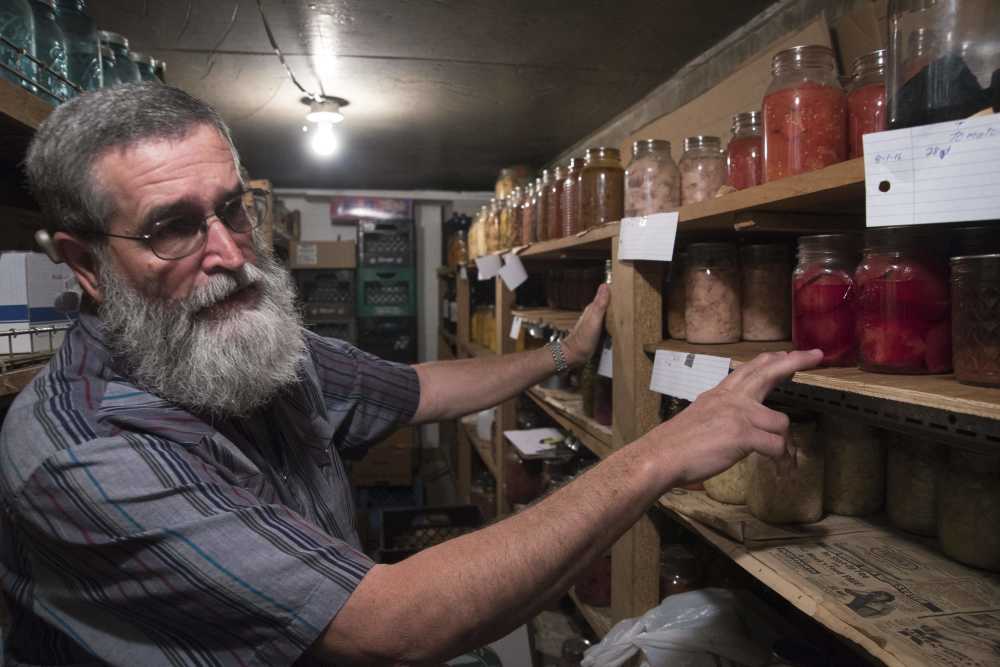
Robert Watkins shows off his canned foods stored in his basement at his home Friday, April 14, 2017 in Scott City.
Andrew J. Whitaker
Snagged, cleaned, sliced, diced, pressured and jarred.
Buffalo fish need to be on the lookout for Robert Watkins and Melvin Enderle, brothers-in-law with a "can-do" mentality.
While many fisherman may not consider the fish "good eating" due to their multitude of small bones, the Scott County residents turn up the heat and turn them into a delicacy.
When the conditions are right in the springtime, the men can be found working a ditch coming off a diversion channel of the Mississippi River with 80-pound line, snagging meals for a date to be determined.
On one particular day in April, the men collected around 100 pounds of fish, much of which will find Watkins' cellar, which contains a variety of home-canned goods ranging from vegetables to fruits to meat.

Robert Watkins shows off his canned foods stored in his basement at his home Friday, April 14, in Scott City.
It's a cost-efficient operation from the start, with no bait needed as the men rig their lines with two bare treble hooks spaced about 18 inches apart above a leaded weight.
Fishing from the bank, they cast, repeatedly jerking while retrieving. They often see swirls and movement on the top of the water, but blindly work the hooks through the water in a grab bag of limbs and creatures.
"Usually there's no telling what you will snag," Watkins says.
Paddlefish, buffalo, carp, Asian carp, gar and an occasional catfish are among the possibilities.
"You can snag a snake, but it's not very likely," Watkins says. "You can catch some of your game fish ..."

Robert Watkins, left, and Melvin Enderle, right, stand in Robert's kitchen before they prepare Buffalo fish to be canned with a pressure cooker at Robert's home Friday, April 14, in Scott City.
He's cut off by Enderle, who interjects, "but you got to release them."
But among their favorites are the buffalo, three of which averaged 15 pounds during their 100-pound haul.
"That's about the only thing we really wanted to get," Enderle says.
When the main channel of the Mississippi River rises between 34 and 39 feet, the larger buffalo fish, a bottom feeder with a relatively small mouth, move into that particular backwater area. It's a rare opportunity for the snagging method.
"You can catch buffalo year round, but buffalo is so hard to catch because they've got such a little mouth and you've got to have a little hook to catch them," Watkins said. "Then when you get into the little hooks, they're not strong enough to hold a big one. It's hard to catch them on a bait reel."
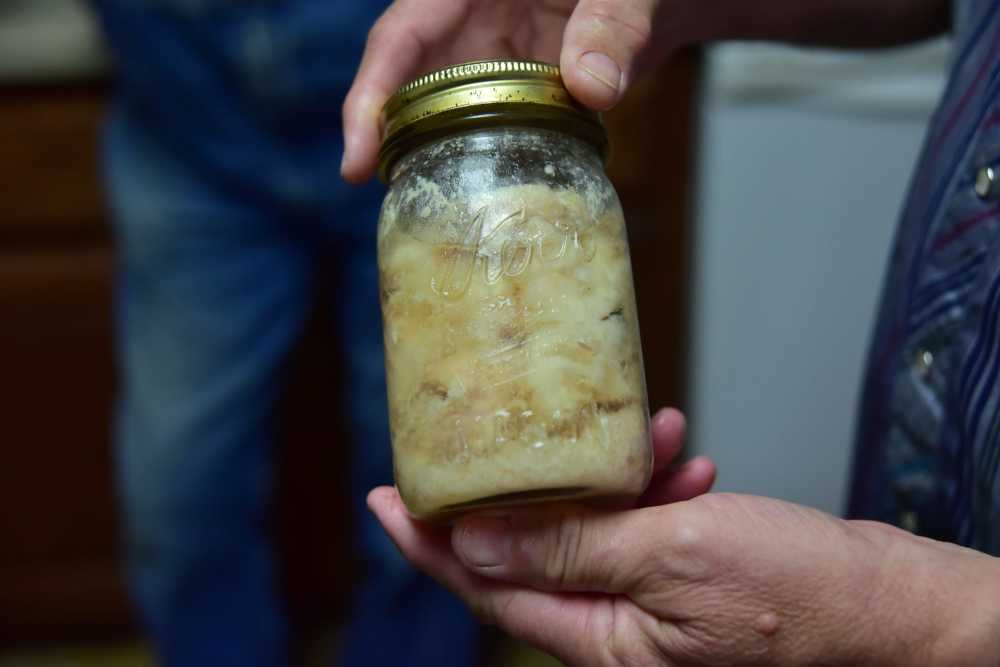
Robert Watkins prepares Buffalo fish to be canned with a pressure cooker in his home Friday, April 14, 2017 in Scott City.
Andrew J. Whitaker
They'll return with the spoils to Watkins' home, where they will cut some boneless fillets, chop off parts of big-boned sections like rib cages for deep frying and cube small-bone sections for the canning process.
They'll stuff the cubes into pint or quart mason jars, add salt, then heat in a pressure cooker, which they use to simultaneously cook the fish and seal the jar.
The entire pressure-cooker operation takes nearly two hours and often involves the expertise of Kay Watkins, Robert's wife and Melvin's younger sister.
"Our mother canned," Kay Watkins says. "Our dad fished backwaters. It's been handed down generation to generation."
Kay and Melvin are fifth-generation Americans, and Kay has her own theory on a tradition that dates well before electric freezers.

Robert Watkins prepares Buffalo fish to be canned with a pressure cooker in his home Friday, April 14, 2017 in Scott City.
Andrew J. Whitaker
"Melvin and I grew up Catholic back in the day when Catholics didn't eat meat on Friday," Kay says. "That's probably the biggest reason they started canning fish, so that they had it year round for every Friday."
When the process is complete, the entire contents of a jar can be consumed, bones and all.
"You can do it with any kind of fish," Robert says. "Most time they do it with these because they got bones in them. When you pressure cook them it softens them up and you never notice them."
Out of the jar, the fish can be prepared in a variety of methods.
"It's unbelievable what you can do," Robert says. "You can probably make something like tuna salad out of it."
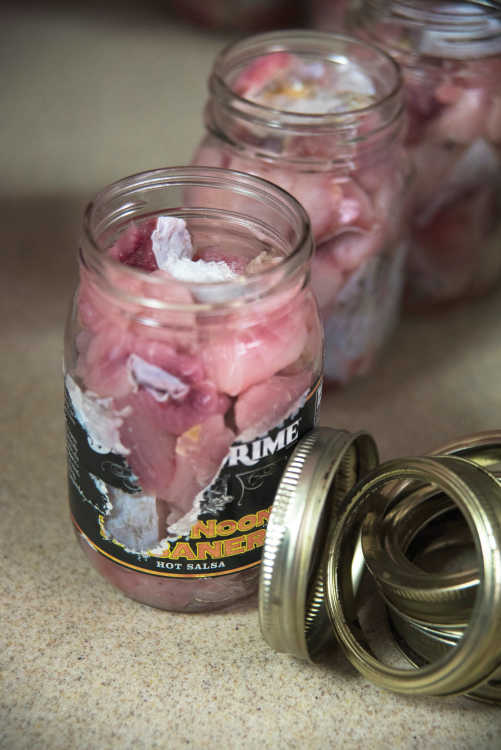
Canned fish at Robert Watkins' home Friday, April 14, in Scott City.
One of the preparations is similar to salmon patties and cooked in a frying pan.
"My mom use to take crackers and take a rolling pin and roll them out real fine," Melvin says. "And then she'd have a bowl to put [the fish] in, after they're canned, and she'll put an egg in with that, and then she'd mix that up real good and make patties out of them and fry them."
The men said as long as the jars retain an air-tight seal, the fish will remain edible for long periods of time.
"Two years later it tastes the same," Melvin says.
Melvin, a farmer and a retired carpenter, built the rural, one-level home with a walkout basement for Robert and Kay more than 30 years ago.

Canned foods stored in Robert Watkins' basement at his home Friday, April 14, in Scott City.
A moose head -- a memento from a 1,650-pound moose Robert bagged (and ate) in Alaska in 2008 -- protrudes from the wall in a corner of the living room with a rifle in its rack. It's mounted above the steps that lead to the basement, where a herd of deer heads line the walls.
"My dad did taxidermy," Robert says. "If I'd get one, he'd mount it."
Three elk, an antelope, a stuffed bear and rattlesnake are also among the trophies.
A longhorn steer head guards the entrance of a cellar -- watch your head -- where multiple shelves line both sides and reveal the extent of the canning operation.
Deer meat can be found in some of the jars, and the preserving process sounds familiar.

Melvin Enderle, left, and his brother-in-law Robert Watkins, right, prepare Buffalo fish to be canned with a pressure cooker at Robert's home Friday, April 14, 2017 in Scott City.
Andrew J. Whitaker
"Cut it up and put it in a jar, little bit of salt, can it, and that's it," Robert says.
The gander is an interesting one, an edible time capsule of sorts.
"The FDA says a year, but, shoot, I've eaten some six, seven years old that is good," Robert says while looking over the stockpile.
Most of the products are from Robert's garden, adjacent to the house, while a few are purchased from local orchards or stores.
Pineapples, pickles, tomato juice, tomatoes, beets, carrots, sauerkraut, salsa, ketchup, applesauce, hog and chicken broth, apples, potatoes, pears, peaches, ham and beans, beans, turnip greens, beef soup, raspberries and jams are just some of the items entombed in glass.
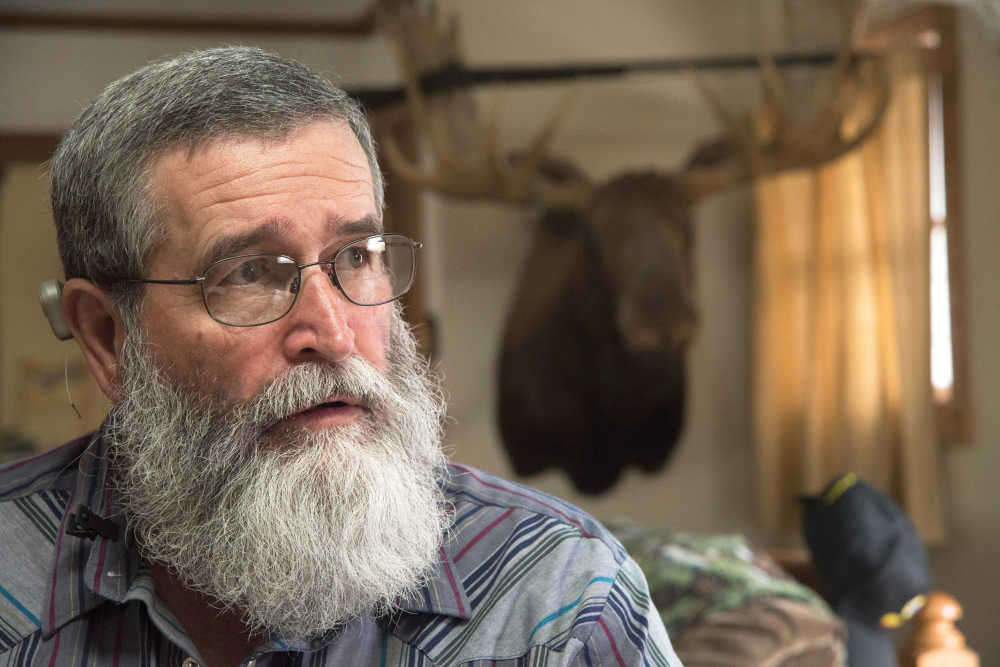
Robert Watkins sits at his kitchen table at his home Friday, April 14, in Scott City.
"Anything you want, we got ... chili," Robert says.
There's even a jar labeled apple pie, made by Kay and explained by Robert.
"Put your crust there, put your apples in and can it," he says.
He later adds, "Think about, what do you buy in the store that's canned? If it's canned in the store, you can can it here."
It's part of a non-wasteful attitude they were brought up on.

Melvin Enderle prepares canned fish to be made into fish patties at his brother-in-law Robert Watkins' home Friday, April 14, 2017 in Scott City.
Andrew J. Whitaker
They've preserved it well.

Melvin Enderle prepares canned fish to be made into fish patties at his brother-in-law Robert Watkins' home Friday, April 14, 2017 in Scott City.
Andrew J. Whitaker

Buffalo fish patties lay on a plate on Robert Watkins' kitchen table at his home Friday, April 14, 2017 in Scott City.
Andrew J. Whitaker

Fried fish and sweet potato fries sit on Robert Watkins' kitchen table at his home Friday, April 14, in Scott City. The food was previously canned by Robert and his brother-in-law Melvin Enderle among many other foods for their consumption.

Melvin Enderle fries up canned fish at his brother-in-law Robert Watkins' home Friday, April 14, 2017 in Scott City.
Andrew J. Whitaker

Canned fish placed in a pressure cooker at Robert Watkins' home Friday, April 14, 2017 in Scott City.
Andrew J. Whitaker
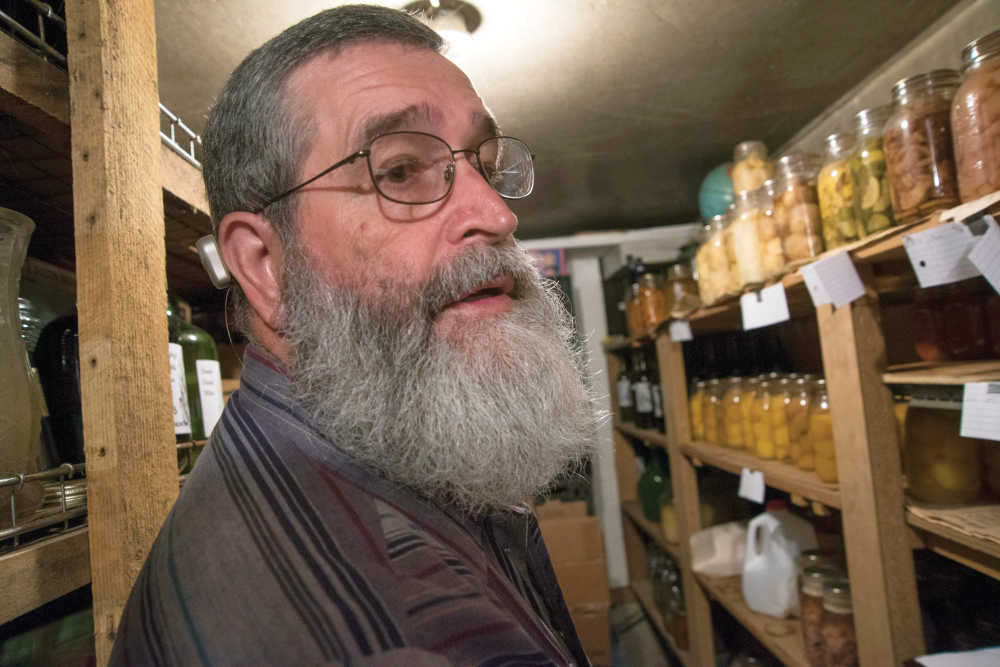
Robert Watkins shows off his canned foods stored in his basement at his home Friday, April 14, 2017 in Scott City.
Andrew J. Whitaker

From left, Melvin Enderle, Kay Watkins and Robert Watkins prepare Buffalo fish to be canned with a pressure cooker at Robert's home Friday, April 14, 2017 in Scott City.
Andrew J. Whitaker





 Local News 4/19/24Inside Becca’s Closet: A mission to dress teens for formal events2The organization Becca’s Closet, which helps young girls get access to formal dresses for dances and proms, is celebrating its 20th anniversary this year. Cape Girardeau is the home to one of two Missouri chapters, and one of 51 in the U.S...
Local News 4/19/24Inside Becca’s Closet: A mission to dress teens for formal events2The organization Becca’s Closet, which helps young girls get access to formal dresses for dances and proms, is celebrating its 20th anniversary this year. Cape Girardeau is the home to one of two Missouri chapters, and one of 51 in the U.S... Local News 4/19/24Southeast Missouri State University's symphony conductor Sara Edgerton to retire5Sara Edgerton, professor of cello and string bass and artistic director and conductor of the Southeast Missouri Symphony Orchestra at Southeast Missouri State University, is set to retire after 33 years...
Local News 4/19/24Southeast Missouri State University's symphony conductor Sara Edgerton to retire5Sara Edgerton, professor of cello and string bass and artistic director and conductor of the Southeast Missouri Symphony Orchestra at Southeast Missouri State University, is set to retire after 33 years...







 Local News 4/18/24Catholic Charities to hold ribbon-cutting for LifeHouse grand opening4LifeHouse Crisis Maternity Home will provide education and support to pregnant women and new mothers at risk of homelessness. After 15 months of construction, the first resident will move in at the end of April. ...
Local News 4/18/24Catholic Charities to hold ribbon-cutting for LifeHouse grand opening4LifeHouse Crisis Maternity Home will provide education and support to pregnant women and new mothers at risk of homelessness. After 15 months of construction, the first resident will move in at the end of April. ... Local News 4/18/24Tenmile looks to add balcony to old Esquire Theater building2Cape Girardeau City Council approved a license and indemnity agreement with Tenmile Holdings LLC on Monday, April 15, for the installation of a marquee sign and awning with column posts for the old Esquire Theater building. ...
Local News 4/18/24Tenmile looks to add balcony to old Esquire Theater building2Cape Girardeau City Council approved a license and indemnity agreement with Tenmile Holdings LLC on Monday, April 15, for the installation of a marquee sign and awning with column posts for the old Esquire Theater building. ... Local News 4/18/24SEMO Orchestra to perform Elgar, Dvorak next week at River CampusThe Southeast Missouri State University Orchestra and guest cellist Julian Schwarz will present a two-piece program Tuesday, April 23, at the River Campus in Cape Girardeau. The concert will begin at 7:30 p.m. in Bedell Performance Hall, 518 S....
Local News 4/18/24SEMO Orchestra to perform Elgar, Dvorak next week at River CampusThe Southeast Missouri State University Orchestra and guest cellist Julian Schwarz will present a two-piece program Tuesday, April 23, at the River Campus in Cape Girardeau. The concert will begin at 7:30 p.m. in Bedell Performance Hall, 518 S.... Local News 4/18/24Police: Bollinger County woman told elaborate lies across multiple investigations, including sexual assault5BOLLINGER COUNTY — Police say a Bollinger County woman told several elaborate lies during sexual assault and harassment investigations in a complex and escalating scheme that targeted the mother of her fiance’s child. Michelle D. Kaempfer of Glen...
Local News 4/18/24Police: Bollinger County woman told elaborate lies across multiple investigations, including sexual assault5BOLLINGER COUNTY — Police say a Bollinger County woman told several elaborate lies during sexual assault and harassment investigations in a complex and escalating scheme that targeted the mother of her fiance’s child. Michelle D. Kaempfer of Glen... Most read 4/18/24City Tavern: Belly up to the bar after Sunday serviceJust when I thought I’d run out of new restaurants to try, a friend with good judgment suggested I might want to take a quick road trip over to City Tavern in downtown Perryville for some good old homestyle cooking. I was intrigued by the...
Most read 4/18/24City Tavern: Belly up to the bar after Sunday serviceJust when I thought I’d run out of new restaurants to try, a friend with good judgment suggested I might want to take a quick road trip over to City Tavern in downtown Perryville for some good old homestyle cooking. I was intrigued by the... Local News 4/18/24Jackson police, DEA host National Prescription Drug Take Back Day1The Jackson Police Department and Drug Enforcement Administration (DEA) will team up to host DEA’s National Prescription Drug Take Back Day on Saturday, April 27. The two organizations will collect different forms of prescription drugs. The...
Local News 4/18/24Jackson police, DEA host National Prescription Drug Take Back Day1The Jackson Police Department and Drug Enforcement Administration (DEA) will team up to host DEA’s National Prescription Drug Take Back Day on Saturday, April 27. The two organizations will collect different forms of prescription drugs. The...






 Most read 4/15/24Cape airport explores funding for possible new air traffic control tower13As Cape Girardeau Regional Airport’s construction projects move along, airport manager Katrina Amos and the Airport Advisory Board may start to look at possible funding options for a new air traffic control tower. Amos said the next big project on...
Most read 4/15/24Cape airport explores funding for possible new air traffic control tower13As Cape Girardeau Regional Airport’s construction projects move along, airport manager Katrina Amos and the Airport Advisory Board may start to look at possible funding options for a new air traffic control tower. Amos said the next big project on...

 Most read 4/12/24Notre Dame to transition to president/principal model beginning July 17Notre Dame Regional High School announced Monday, April 8, that it will be transitioning to a president/principal model Monday, July 1. Current principal Tim Garner will assume the role of president, while assistant principal Paul Unterreiner will...
Most read 4/12/24Notre Dame to transition to president/principal model beginning July 17Notre Dame Regional High School announced Monday, April 8, that it will be transitioning to a president/principal model Monday, July 1. Current principal Tim Garner will assume the role of president, while assistant principal Paul Unterreiner will...
















